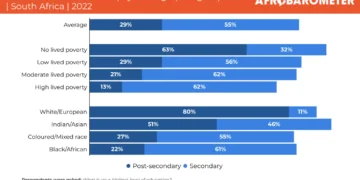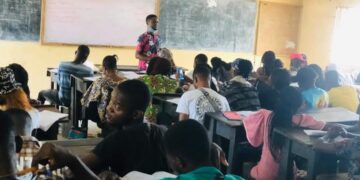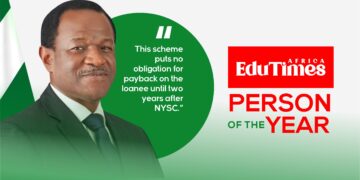The recent strike by University lecturers in Nigeria and the concomitant effect on the quality of education has again brought to the fore the need for self-tutorship as a sine qua non for quality education. For over eight months, public universities in Nigeria were under lock and key and students left to the vagaries of life. This development prompted many patriots to call for a re-examination of our educational system and mode of education. Proponents posit that self-tutorship will build up an attitude of searching for knowledge in Nigerians whether in school or out of school, whether deprived or favoured. Self-tutorship entails the inculcation of a “Do-It-Yourself mentality” in students rather than the pervasive spoon-feeding pedagogical style of rote learning and regurgitation of lecture notes aimed at just passing examinations.
Total quality education stresses the need for continuous improvement in knowledge acquisition from cradle to grave. Education is a lifelong endeavour and tutoring yourself means understanding your own learning process and being able to guide yourself through the mastery of a new concept or skill. To tutor yourself, you must take an objective and systematic approach to identifying and working on your weaknesses, both real and imagined. In short, self-tutorship simply means being your own teacher and developing an inquisitive mind that relentlessly seeks out knowledge as a researcher who probes issues to tease out practical solutions to problems.
The British system of education foisted on Nigeria at Independence predominantly sought to produce administrators and personnel who will replace expatriates in all walks of life. This necessity, unfortunately, led to the perception of certificates and degrees as meal tickets because graduates were recruited as soon as they completed their programmes, to fill the numerous vacancies that then existed.
Inadvertently, this led to the substitution of certificates and degrees for real education and engendered a newfangled desperation, with some unscrupulous Nigerians procuring them with money.
A school of thought has always regarded formal education as inadequate, incomplete and overtly formalised. During the now suspended ASUU strike, a professor of political science, Professor Ayo Olukotun stirred the hornet’s nest when he wrote an article in his Friday column on the back page of Punch Newspaper of October 7, 2022 titled “Self-tutoring, the missing link in Nigerian education”. He posited that the failure to place a premium on the values and virtues of self-tutoring is one of the reasons for the eroding quality of education generally in Nigeria.
Professor Olukotun gave copious examples of people all over the world who possess various university degrees which they cannot defend. He posited that some Nigerians are substituting certificates for real education which straddles formal and informal learning and prioritizes lifelong learning well beyond the classroom.
In this age of Information Communication Technology (ICT) with its numerous search engines and plethora of online courses, educational applications, websites and education blogs, a resourceful student is equipped to acquire knowledge in a decentralized learning environment in a seamless manner. For sure, this is not totally new as a large chunk of Nigerian education began with self-tutorship through templates like Exam Success and correspondence’ courses. Juggernauts like the late sage, Chief Obafemi Awolowo and Aare Afe Babalola were products and champions of self-tutorship.
Professor Tony Eagleton of the University of Lancaster was quoted as saying that formal education is a waste of time while Portuguese writer, Jose Saramago who despite dropping out of school at 12 years because of poverty won the Nobel Prize for Literature in 1998 through self-tutorship.
Without doubt, self-tutorship will raise original thinkers and scholars who will contribute more meaningfully to the development of the country with their seminal ideas and insights than those who are basically trained to rely on class notes, recommended textbooks and lectures. Professor Akin Mabogunje in an article titled “Awo and the Opticom Idea” published in the book, Awo on the Trail of a Titan: Essays in Celebration of the Obafemi Awolowo Centennial said “…ideas are the straws from which serious governmental policies are made. They define the vision of particular governments on the transformation envisaged for the society over which they rule”.
To achieve this laudable goal, there is an urgent need to fill the patent vacuums. Nigeria currently lacks the necessary infrastructure in our education ecosystem. To successfully bridge the knowledge gap, we need to increase the number of our public libraries and ingeniously stimulate the reading culture through sundry means. We need to encourage parents to buy books for children as gifts during birthdays, anniversaries and celebrations. Internet-enabled mobile phones, tablets and laptops, with close monitoring and controls, should be procured for children and wards to stimulate their interests in scholarship, sports and vocations. Parents should build libraries in their living rooms rather than drinking bars and they should read books too, to encourage their children and wards as you cannot give what you do not have.
Furthermore, something drastic should be done to reduce the number of out-of-school children especially in northern Nigeria where renegades are discouraging and disparaging western education through the instrumentality of Boko Haram and its ilk. Our creative industry and world famous singers and artistes should be mandated to extol the virtues of education in their songs, movies, skits and body language rather than the current glorification of money and epicurean interests.
Generally, more women should be educated and encouraged to participate actively in politics and the economy to stimulate wholesome development of the society. According to a popular Fante parlance, “when you educate a woman, you have educated a nation.” It is revealing that countries were women are encouraged to participate actively in politics and the economy are leaders in the world.
In sum, total quality education can only be achieved in addition to the afore-discussed points when due attention is given to the education sector by the three tiers of government; essentially through intentional budgetary preferential system as advocated by the UNESCO recommendation of twenty five per cent of annual budget provision for educational endeavours.





































































 EduTimes Africa, a product of Education Times Africa, is a magazine publication that aims to lend its support to close the yawning gap in Africa's educational development.
EduTimes Africa, a product of Education Times Africa, is a magazine publication that aims to lend its support to close the yawning gap in Africa's educational development.

